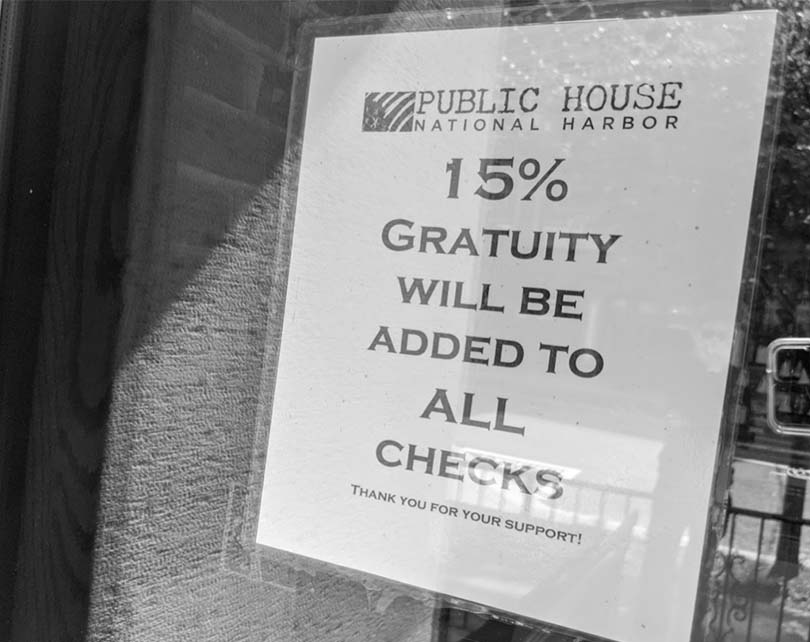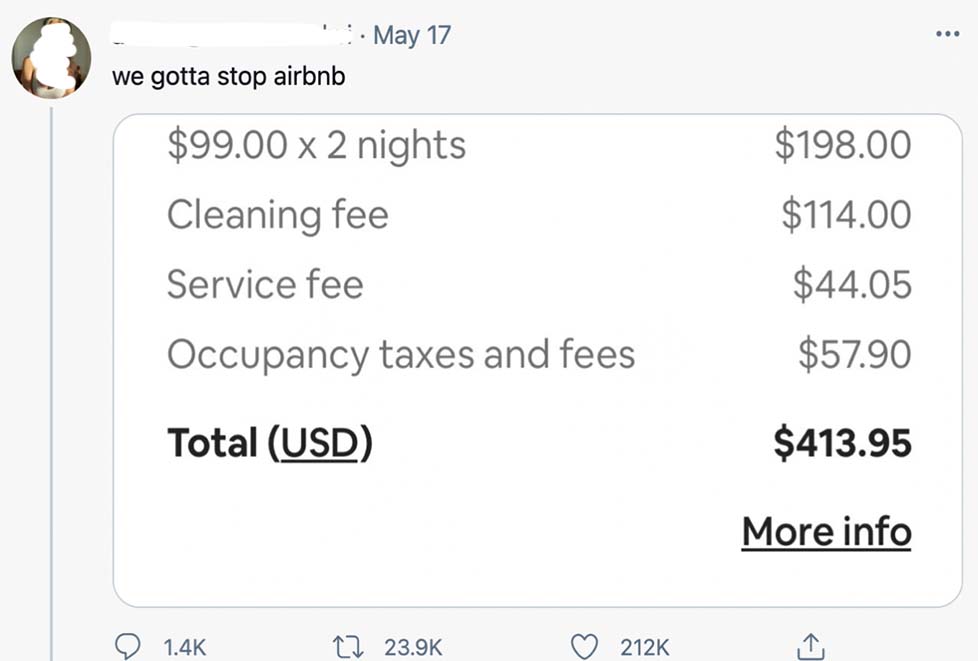The Public House in Fort Washington, Md., is known for its generous eight-ounce Angus burgers and spicy jambalaya. But it also serves patrons who don’t pay attention a bill that includes a surprise 15 percent tip.
When I saw the signs on a visit to National Harbor last week, I thought I had misread them. I walked around the block and then returned to take this picture.

The Public House menu is equally explicit: “There will be an automatic 15% gratuity added to the final bill.”
The Public House’s mandatory tip is just one of many new fees popping up during the final days of the COVID-19 pandemic. It turns out there’s a specific reason for these surcharges. The hospitality industry believes it can and it should add these extras — and that you should obediently pay them. (Here’s my ultimate guide to travel food.)
It’s wrong, of course.
What’s with these Airbnb fees?
The same day I visited the Public House, I received an email from an Airbnb customer. The popular vacation rental platform charged her a $6 “internet connection fee” — a total of $12 — during her two-night stay.
She says Airbnb didn’t even bother disclosing it before she rented.
It’s just the latest in a barrage of recent social media posts about Airbnb’s fees.

I’ve been complaining about these extras for years. It’s nice to have a little company.
So now that people are traveling again, what are they supposed to do about these mandatory restaurant tips and service fees? Should they just shut up and pay them? Should they protest?
Or should they do something else?
Why are businesses charging mandatory tips?
You can understand — and almost sympathize with — restaurants that charge a mandatory tip. The business model for American restaurants is so upside-down. It requires many restaurants to price their food at a loss, then try to make up the difference through alcohol sales.
They also trim costs by paying their staff less than minimum wage, forcing them to rely on tips to make a living. That’s immoral.
The actual cost of the meal would be at least 15 to 30 percent higher if you are going to pay your staff a living wage. But restaurants in the United States can legally lure in patrons with lower prices — and then guilt them into paying more for their meal by tipping the waitstaff.
Now the dynamic has changed. After the pandemic, they don’t trust you to tip willingly, so they’re forcing you to do it.
Problem is, now you can’t buy a meal for the price on the menu. It’s impossible — you must pay an additional 15 or 20 percent.
That crosses a line.
Why are service fees becoming a problem?
Fees have always been a reliable source of income for airlines, hotels and vacation rentals. The specialty travel insurance company battleface recently commissioned a study on fees by the market research firm Opinium. It found the most common travel charges are for cancellation fees (19 percent), charges for changing travel dates (19 percent), fees for changing travel times (14 percent), and costs associated with baggage loss or delay (10 percent).
“Our research shows that many of these fees, including those for cancellations and changing travel times, are avoidable, either with careful planning or an insurance policy that covers the event,” says Sasha Gainullin, CEO of battleface.
But lately, it has felt like companies have wasted no opportunity to pick up a little extra revenue. The $6 a night connection fee is one such example.
And for these fees, too, you can blame the pandemic. Desperate to recover some lost revenue, businesses are charging for everything. Think about it — an internet service charge at a vacation rental?
You might as well start charging a fee for electricity and plumbing.
Wait, no.
I didn’t mean to give them any ideas!
So, now that people are out there traveling again, businesses are getting creative with their fees and surcharges. I expect to see more of these desperation fees in the coming weeks. They are inevitable. (Here’s why you always need to check your order before you leave the restaurant.)
These are the three types of mandatory restaurant tips and service fees you’ll see
When you look at the fee landscape, there are several types of mandatory service charges.
- Service fees and surcharges disclosed before the transaction. The Public House is a good example. It notifies patrons in writing, both on the menu and with signs. These disclosures don’t make the fees right, but they at least allow you to walk away.
- Service fees and surcharges disclosed during the transaction. These are referred to as “drip” pricing, and they are more problematic. I ordered a birthday cake for my son from a bakery online. By the time I got to the end of the transaction, it had added a 10 percent tip. But why? I picked up the cake, and it provided no other service. Fortunately, I could remove the tip in the online ordering system.
- Service fees and surcharges disclosed at the end of the transaction. These are the worst. If you didn’t read the disclosures or if there were no disclosures, then you’re going to get a surprise at the end of your meal or vacation rental stay. Your hosts may claim that they revealed the “possibility” of more fees in the contract, but who are they kidding? It’s an ambush.
Is mandatory tipping in restaurants legal?
Can a restaurant force you to tip? Yes. It’s not illegal to add a mandatory service charge or tip to your bill. But it’s morally wrong. If you call it a tip, then it should be voluntary. (Here’s why you should tip 25%.)
So why are we seeing more mandatory fees and surcharges? What’s different this time? I think the hospitality industry feels emboldened by the pandemic and justified in adding these extras. And they think they can get away with it.
Think about it. How many articles have you read about the hardships hotels and restaurants have faced since the start of the pandemic? And about how we should be supporting these businesses at a time like this? Public sentiment is definitely on their side, and they know it.
There’s also a sense that we, the consumers, should be paying more. We’re so darned price-sensitive that we force merchants to tell little white lies about their prices to get us in the door. We make them price their products dishonestly (check out those two-for-ones at CVS if you want an institutional case-in-point).
But most of all, they are doing it because they think they can get away with it. The consumer advocates have all been fired from their media jobs. The remaining watchdogs have been domesticated — turned into “brand ambassadors” who hawk points-earning credit cards and cheerfully blog about travel deals.
Mandatory tips must end now
Lying about a price is always wrong.
And don’t you dare drag service workers into this argument! They deserve a living wage, but you don’t lie to your customers and then coerce them into paying more. That’s just a diversion and a weak justification for the hospitality industry’s dishonesty.
In the meantime, if you see a mandatory restaurant tip, walk away. Visit a restaurant that doesn’t charge these forced tips. Likewise, if you see a junk fee on your vacation rental invoice, move on to a different rental. That sends a powerful message to a rental platform and an owner that you don’t tolerate lying.
Let me be clear about this: These fees should not exist. If businesses can’t self-regulate, then we need strong rules at the state and federal level preventing them from adding automatic gratuities or service charges.




